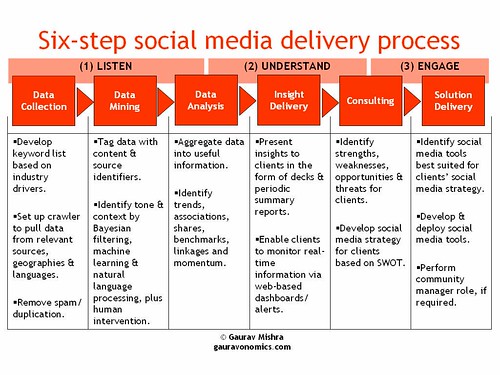Social media practitioners often talk about it in cryptic “conversation is an art form” terms, but you can break down the social media delivery process in six discrete steps that correspond to the oft-quoted Listen -> Understand -> Engage model:-
1. Data collection
2. Data mining
3. Data analysis
4. Insight delivery
5. Consulting
6. Solution delivery

If you look hard at these six steps, you’ll find that many of them are driven by dynamics that make them very susceptible to outsourcing –

Sudhakar Ram writes below in his column about the first two waves after that i have posted column on third wave of outsourcing !! interesting read go on
As a participant in and observer of the Indian IT industry for over two decades, I can clearly see that software and services exports from India have gone through two waves and that a Third Wave is now unfolding.
Wave 1, which we can trace to the 80s and 90s, clearly established that Indian IT professionals were competent and could be trusted to deliver world-class work. This was the staff augmentation era of the industry, largely serviced through onsite services.
Wave 2, starting off in the mid-90s and currently at its peak, established India as an offshore programming destination. With labor arbitrage as the basic value proposition, Indian companies established large offshore development centers that had competent technical staff, mature CMM processes and world-class infrastructure. While the trigger for Wave 2 was the offshore initiatives by companies like GE, Motorola, Nortel etc., the Y2K bug gave it the necessary momentum. Although things slowed a bit after the dotcom bust, the shrinking IT budgets actually gave an impetus to large Fortune 500 companies to use offshore centers as a mainstream sourcing option.
India Making Millions Servicing U.S. Social Media Ecosystem
By Daya Baran at October 19, 2008 8 Comments
For a mere $2 a thousand CAPTCHAs can be solved and a thousand blog comments or MySpace friend requests can be sent generating lots of traffic and links for that property and hence, increasing its online ad revenue. Workers in India process the data using CAPTCHA syndication web based kits, API keys, and thousands of proxies to make their work easier, and the process more efficient.
In fact, entire social media and online advertising campaigns featuring cool graphics, widgets, RSS feeds, and other sitewide interactive features are being created and executed from India. “Anything that can be outsourced is being outsourced today in India,” said Rajdeep Sahrawat, vice president of Nasscom, or the National Association of Software Service Companies, an Indian software industry trade organization that closely monitors trends in outsourcing.
India is no longer a call center outsourcing destination. It has rapidly become a global hub servicing the U.S. social media ecosystem and as well as the higher knowledge industries. Services such as tax filing and preparation, medical diagnoses, legal work, and financial portfolio analysis are turning to India for sophisticated knowledge processing and analysis work. A start-up that provides such services is PreMedia Global and in two years, it has grown from a brother-and-sister operation to a company with 900 employees. Initially, they considered launching a call-center operation, said co-founder Kapil Viswanathan, who studied engineering at Stanford University. However, they quickly saw that the nature of outsourcing was changing. “High-end, knowledge-based services — that’s where the growth is coming from,” he said. “We think this is just the tip of the iceberg.”
The California Fair Trade Coalition said virtually any job that uses a computer could be outsourced, and it argues that U.S. trade laws should be changed to make it more difficult for companies to send work overseas. “Those countries have large and rapidly growing pools of talented people with much lower incomes than people with similar skills in the United States”, Imelda Abarca, director of the coalition. But other experts say the threat to high-end American jobs is overstated. India remains “an undergraduate factory,” said Raffiq Dossani, a Stanford University researcher who studies higher education in the South Asian country. “This limits the kind of work that can be outsourced to India.”
Pervez Sikora, a former U.S. newspaper executive who is now chief operating officer for 2AdPro Media Solutions said he’s been approached by Silicon Valley companies that want to outsource their marketing work. It is not just U.S. companies that are flocking to India. European, Japanese as well as Arab companies are tapping into India’s legions of highly trained graduates that India’s vast college system produces every year. But the number of U.S. companies using these services is expected to increase due to the financial crisis which is forcing them to cut costs.
And, it is no longer simply tech companies that are looking to cut costs using these services - Disney, DreamWorks, and drugs manufacturing companies are also tapping the India pool. “We are getting multiple inquiries a day”, said Todd Brownrout, chief marketing officer at 2AdPro, which expects to expand from 350 employees to 1,000 next year. Two years ago, it was a tough sell to convince newspaper executives that someone sitting halfway across the globe could produce ads that are accurate and on-time. Sanjiv Gupta, chief executive of Hyderabad-based Pressmart, which provides Internet technology services to publications, argues this outsourcing model can be applied to editorial content. “It’s outsourcing of creativity,” he said.
While the debate continues over just which American jobs may be vulnerable to outsourcing, executives like Sikora acknowledge that the new global economic order is forcing Americans to reposition their careers. “People have to understand how jobs are changing and start reinventing themselves,” he said. “No one will be able to stop this now.”


No comments:
Post a Comment